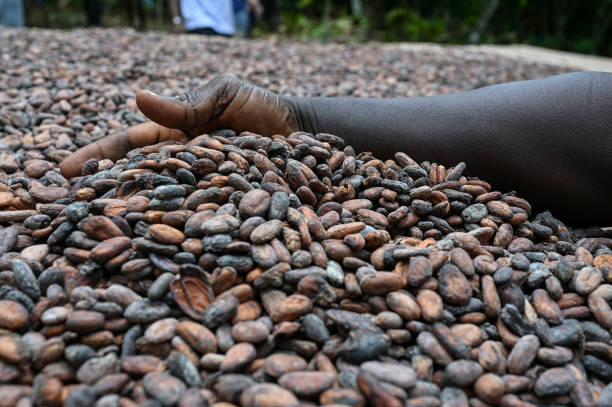Bitter Harvest: Why West Africa’s Cocoa Output Is Falling

Once Sweet, Now Souring
For decades, West Africa—led by Ivory Coast and Ghana—has been the beating heart of global chocolate. These two nations alone once delivered over two million tonnes of cocoa each planting season. Yet today, that supply is shrinking. A sharp estimated10% decline in the 2025/26 harvest signals more than a poor crop—it signals a crisis in cultures, climates, and economies.
Even as farm-gate prices flirt with USD 10,000 per tonne on futures markets, the beans aren’t growing. Why? Because climate is hot; trees are old; diseases are vile; miners are invading lands; and agrarian youth are leaving for cities. This is not scarcity—it’s structural collapse.
Climate’s Slow Burn
Across the cocoa belt, temperatures are rising—and so is misery. Studies show that temperatures above 32°C—on an increasing number of days during the main crop season—can shrink yield and spoil bean quality. In Ivory Coast and Ghana, the region suffers an extra three weeks of extreme heat annually compared to a pre-heated planet.
Rainfall patterns have shifted too: dry spells followed by deluges interrupt flowering and pod development. Ghana’s regulator, COCOBOD, recently warned that excessive rainfall has spurred fungal outbreaks—especially of Phytophthora megakarya, the dreaded black pod disease—which can wipe out up to one-third of a harvest.
Diseases in the Shadow of Trees
Cocoa planting systems in the region are older than the challenges they face. The lack of replanting initiatives has left farms reliant on trees well past peak productivity—trees vulnerable to Cacao Swollen Shoot Virus (CSSV) and black pod disease.
SOURCE: Wikipedia
CSSV alone has claimed millions of trees across Ghana, killing them within three to five years. Pods become shriveled; crops vanish. The only answer is eradication—but that requires funding, seedlings, and trust.
Illegal Gold, Legal Pain
Cocoa farmers once believed gold was good luck. Now, gold is stealing their farms. So-called “galamsey” miners pour into cocoa-growing regions, clearing land, polluting water, and leaving fewer hectares for cacao. Ghanaian authorities estimate that over 190,000 acres of farm land were commandeered by illegal small-scale mining.
The irony is bitter: cocoa is Ghana’s heritage, yet gold—often extracted by external capital—delivers short-term cash at the cost of long-term crop viability.
Smuggling and Shadow Markets
Meanwhile, exit prices remain stuck. Governments fix cocoa prices at levels far below global markets to protect fiscal balance—and farmers pay the price. Facing richer buyers across borders in Togo or Burkina Faso, many resort to smuggling. An estimated 350,000 tonnes of cocoa was moved illegally in the 2023-24 season alone, shrinking official sales and shrinking trust.
The result is a paradox: global shortages and rising chocolate prices—but farmers rarely benefit. Instead, export earnings cushion national accounts while rural incomes falter.
A Crisis of Age and Abandonment
Field reports from Reuters reveal that field-level flowering in Ivory Coast dropped sharply—mortality rates for cherelles reaching 15–20% above forecasts in June, even when rains arrived. That suggests not just cyclical ebb, but systemic failure. Ivory Coast output is expected to drop from 2 million tonnes to around 1.6 million in 2025/26. Ghana—once close to one million tonnes—may struggle to exceed 500,000 tonnes.
Ghana’s earlier optimism—cited in USDA reports that production would rebound to 650,000 tonnes—now seems overly hopeful. Sector insiders suggest 500,000 is more realistic.
Farms Without Futures
Cocoa farming once nourished millions of households. Today, aging trees, climate stress, and low returns are driving youth away. Farmers struggle to invest in replanting, fertilizer, or pest control when incomes stagnate and debts rise.
Reports from rural areas underscore a shift: children once expected to inherit farms now aspire to city jobs. Cocoa may remain in cultural memory, but its role as a livelihood is fading.
How to Pollinate Resilience
There are solutions—if they are allowed to work. A new study co-authored by researchers at the University of Oxford found that boosting pollination naturally—through leaf litter management, shade trees, and fewer chemicals—could raise yields by up to 20%, even under warming conditions. That’s without expanding farms or harming forests.
Combining such biodiversity-friendly methods with disease-resistant planting, improved pruning, and better agronomic guidance could stabilize smallholder yields across West Africa.
What Cocoa Means for the World
Global consumers may not see it yet, but cocoa shortages matter. Earlier in 2025, cocoa prices breached £5,800 per tonne, pushing confection prices upward globally. A chocolate bar is now not just a treat—it is testimony to flawed systems.
The decline in cocoa production should ring alarm bells not just for Africa but for global food security. Cocoa isn’t just a raw material for sweets—it supports a multi-billion-dollar chocolate industry spanning Europe, Asia, and the Americas. As West Africa’s output declines, major confectionery companies may be forced to seek alternatives or reformulate products, which could alter taste, texture, and affordability for consumers worldwide.
Beyond candy, cocoa also plays a crucial role in emerging cosmetic and pharmaceutical industries. Cocoa butter is a staple in lotions, soaps, and even certain medicinal salves. A decline in raw input could send ripples across supply chains that go far beyond grocery shelves, affecting prices and availability in entirely unrelated sectors.
And then there is the ethical dilemma. Consumers in the West are increasingly concerned about “bean to bar” transparency—how fairly are farmers treated, how sustainably is cocoa grown? A disrupted supply chain threatens not only production but also the progress made on ethical sourcing. If Africa loses its grip on cocoa due to climate and policy neglect, those gains in fair trade and transparency could be reversed, exposing the industry to renewed criticism.
Still, farmers receive fixed prices set by national boards—often far below market reality—meaning that even as exports bring home forex, local ownership and reinvestment remain elusive.
What Needs to Be Done
Urgent replanting programmes using disease-resistant stock.
Expanded pollinator-friendly farm practices.
Integrated climate risk advisory services.
Enforcement on illegal mining and smuggling.
Market reforms ensuring fair prices for farmers.
Yet these require more than money—they require political will and sector structure reform.
The Road Ahead
West Africa’s cocoa harvest is no longer just a cash crop—it is a reflection of whether smallholder agriculture, culture, and climate can coexist in a warming world. If governments and stakeholders fail to act, the losses could deepen—pushing production toward more stable players like Brazil or Indonesia.
But if local strategies are empowered, if reforestation merges with regeneration, if pollination becomes part of policy, cocoa may yet remain West Africa’s sweet inheritance.
Recommended Articles
You may also like...
Bundesliga's New Nigerian Star Shines: Ogundu's Explosive Augsburg Debut!

Nigerian players experienced a weekend of mixed results in the German Bundesliga's 23rd match day. Uchenna Ogundu enjoye...
Capello Unleashes Juventus' Secret Weapon Against Osimhen in UCL Showdown!

Juventus faces an uphill battle against Galatasaray in the UEFA Champions League Round of 16 second leg, needing to over...
Berlinale Shocker: 'Yellow Letters' Takes Golden Bear, 'AnyMart' Director Debuts!

The Berlin Film Festival honored
Shocking Trend: Sudan's 'Lion Cubs' – Child Soldiers Going Viral on TikTok

A joint investigation reveals that child soldiers, dubbed 'lion cubs,' have become viral sensations on TikTok and other ...
Gregory Maqoma's 'Genesis': A Powerful Artistic Call for Healing in South Africa

Gregory Maqoma's new dance-opera, "Genesis: The Beginning and End of Time," has premiered in Cape Town, offering a capti...
Massive Rivian 2026.03 Update Boosts R1 Performance and Utility!

Rivian's latest software update, 2026.03, brings substantial enhancements to its R1S SUV and R1T pickup, broadening perf...
Bitcoin's Dire 29% Drop: VanEck Signals Seller Exhaustion Amid Market Carnage!

Bitcoin has suffered a sharp 29% price drop, but a VanEck report suggests seller exhaustion and a potential market botto...
Crypto Titans Shake-Up: Ripple & Deutsche Bank Partner, XRP Dips, CZ's UAE Bitcoin Mining Role Revealed!

Deutsche Bank is set to adopt Ripple's technology for faster, cheaper cross-border payments, marking a significant insti...

